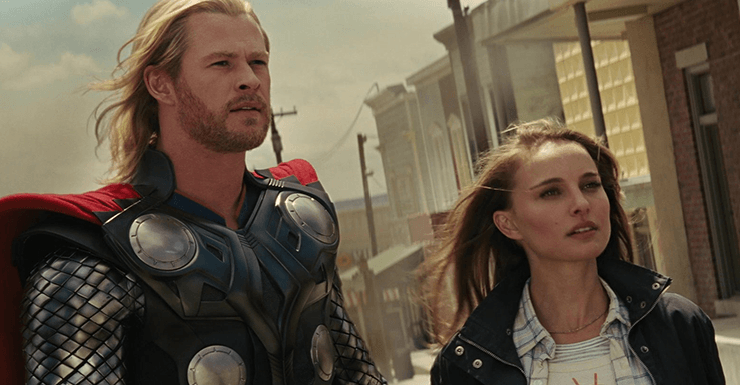In Marvel’s grand pantheon of heroes that debuted in the early 1960s, you had an impressive cross-section of genres. The Fantastic Four were science fiction, Iron Man was technothriller, Hulk was horror, Spider-Man and Daredevil were New York-based adventure, Captain America was bigger nationwide adventure, the X-Men were YA social commentary, and so on. (Yes, I’m simplifying.)
It was left to Thor to give us high fantasy. Grand adventure, sword-and-sorcery stuff, with a huge dollop of Norse mythology and a lot of pseudo-Shakespearean dialogue to give it the appearance of weight. But it was a very convincing appearance, and Thor quickly became the powerhouse of the Marvel Universe.
Stan Lee and Jack Kirby’s version of Norse mythology only overlaps with Snorri Sturluson in parts. Thor was altered from a red-haired, bearded lout to a blond-haired, clean-shaven nobleman, and while some characters from Norse mythology were present—Odin, Loki, Balder, Frigga, Sif, Heimdall—others weren’t, or only had small roles, and new characters were created as well—notably the Warriors Three, who were inspired, not by Norse myth, but by Errol Flynn’s Robin Hood (Fandral), Charles Bronson’s various roles, particularly O’Reilly in The Magnificent Seven (Hogun), and Shakespeare’s Falstaff (Volstagg).
Most notably, Lee and Kirby altered the relationship among Odin, Loki, and Thor. In Norse myth, Loki and Odin were blood brothers. In Marvel Comics, Loki and Thor are both sons of Odin, the former adopted in an agreement with the Frost Giants.
Initially, Thor shared his existence with a doctor named Donald Blake, who required a cane to walk. Blake found Thor’s hammer in Scandinavia, which was inscribed with the words, “Whosever holds this hammer, if he be worthy, shall have the power of Thor.” He picked it up and was apparently worthy, as he was transformed into Thor. Soon thereafter it was revealed that Thor’s father Odin had forced Thor to share his existence with a mortal in order to teach him humility.
Like many of Marvel’s early heroes, Thor started out in one of Marvel’s many anthology titles (Journey Into Mystery in his case, which was published alongside Tales of Suspense, Tales to Astonish, Strange Tales, Amazing Fantasy, etc., all of which were eventually replaced by superhero solo titles). He quickly became a major player in the Marvel Universe, with stories taking place both on Earth and in Marvel’s interpretation of Asgard, which was a chance for Jack Kirby to let his already-fertile imagination run wild, with bright colors, bold architecture, and impressive costumes. Every artist who followed Kirby used his template for how to portray Asgard, and the writers followed Lee’s lead in mixing epic cosmic grand adventure with character-focused stories about people and relationships (Loki’s resentment of Thor and Odin, the love triangle among Thor/Blake and Jane Foster and Sif, Thor’s friendship with Balder, and so on).
Buy the Book
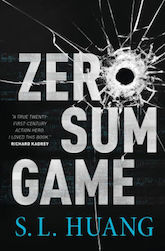

Zero Sum Game
A hallmark of Marvel’s first twenty years or so were backup features that fleshed out the world, and no book had a better set than Thor with the “Tales of Asgard” stories that have been a staple of Thor comics. (The Warriors Three were actually introduced in one of those backup stories.)
In 1983, Walt Simonson—who had previously worked as an artist on the title—took over as writer and artist of Thor and he took the book to new heights, weaving more Norse mythology into the storylines, and also abandoning the Blake identity. Usually when writers make changes to the status quo, they don’t last—Tony Stark becomes Iron Man again, Superman lives again, Bruce Wayne is Batman again, Spider-Man goes back to the red-and-blue costume, etc.—but it’s telling as to how uninteresting it was that the Blake identity has pretty much stayed out of the picture in the ensuing three-and-a-half decades.
On the heels of the character’s first live-action appearance in The Return of the Incredible Hulk, Sam Raimi expressed interest in doing a movie featuring Thor, but was unable to get the studios on board with the notion. (Now there’s an alternate universe worth exploring, with Raimi doing a good superhero movie in the early 1990s instead of having to wait until 2002 to get him behind the camera of one.) Marvel’s early relationship with Paramount led to talks of doing a Thor TV show on UPN (back when that, y’know, existed) with Tyler Mane in the title role, then it went back to being a film with first David Goyer, and then Matthew Vaughn, and then Guillermo del Toro attached to it. Hilariously, del Toro left Thor to instead direct The Hobbit—which he then didn’t actually direct.
Instead, Marvel hired Kenneth Branagh, a talented director who cut his teeth doing Shakespeare. Seemed a perfect fit. Mark Protosevich had written a script for the film back when it was to be directed by Vaughn, and a new script was written by Ashley Edward Miller & Zack Stentz (who also co-scripted X-Men: First Class, and worked on Gene Roddenberry’s Andromeda, Terminator: The Sarah Connor Chronicles, and Fringe, and who, in the interests of full disclosure, are friends of your humble rewatcher) and Don Payne based on a story that welded Protosevich’s script to a treatment by Thor comics writer J. Michael Straczynski.
Branagh and the casting people did a superlative job putting this one together. Chris Hemsworth was cast in the title role (amusingly, both his brother Liam and Tom Hiddleston auditioned for the part also), while Branagh recommended Hiddleston to be cast instead as Loki (the pair of them had worked together on a stage production of Anton Chekhov’s Ivanov and on the TV show Wallander). Sir Anthony Hopkins plays Odin, Rene Russo plays Frigga, Idris Elba plays Heimdall, Jaimie Alexander plays Sif, Colm Feore plays Laufey, and Ray Stevenson, Tadanobu Asano, and Josh Dallas play the Warriors Three. (Dallas replaced Stewart Townsend, who in turn replaced Zachary Levi, who had to quit due to a scheduling conflict. Levi will wind up getting the part in Thor: Dark World and Thor: Ragnarok due to Dallas being unavailable.) On the Earth-bound side of things, Natalie Portman plays Foster (now an astrophysicist instead of a nurse), Stellan Skarsgård as Foster’s mentor Erik Selvig, and Kat Dennings as Foster’s intern Darcy Lewis. In addition, we get a bunch of S.H.I.E.L.D. folk, including the return of Clark Gregg and Samuel L. Jackson as Phil Coulson and Nick Fury, respectively, last seen in the two Iron Man films, plus the debuts of Maximiliano Hernández as Jasper Sitwell and Jeremy Renner as Clint Barton.
Hemsworth, Hiddleston, Jackson, Gregg, Skarsgård, Renner, and Hernández will all appear next in Avengers. Hopkins, Elba, Russo, Alexander, Stevenson, Asano, Dennings, and Portman will all next appear in Thor: Dark World.
“God, I hope you’re not crazy”
Thor
Written by Mark Protosevich and J. Michael Straczynski and Ashley Edward Miller & Zack Stentz and Don Payne
Directed by Kenneth Branagh
Produced by Kevin Feige
Original release date: April 17, 2011
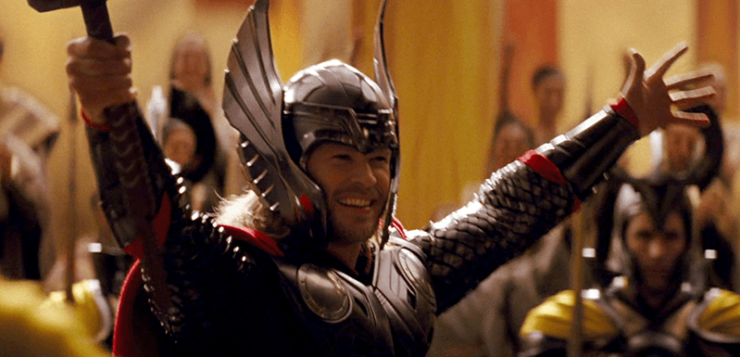
In the deserts of New Mexico, astrophysicist Dr. Jane Foster has dragged her mentor, Dr. Erik Selvig, to the middle of nowhere to observe a phenomenon that will prove her theories. (What those theories are or what they’ll see to prove them is never really spelled out.) Travelling in an RV driven by Foster’s intern, Darcy, they detect an aurora far greater than anything Foster has seen before, and the cosmic storm that ensues has a person inside it—who accidentally gets hit by the RV.
Jump back a thousand years, and Odin of Asgard is telling his two sons, Thor and Loki, the stories of how he defeated the frost giants of Jotunheim when they were menacing the humans of Midgard (which is Earth). Odin lost an eye in the battle, but was victorious over Laufey, and confiscated the source of their power, the Casket of Ancient Winters.
Moving forward to the present day, Thor is now all grow’d up and being officially announced as the heir to Asgard’s throne. Taking in the adoration of the crowd, Thor eventually kneels before Odin, as well as his mother Frigga, Loki, and fellow warriors Sif, Fandral, Hogun, and Volstagg.
In mid-ceremony, however, a few frost giants invade the armory and try to make off with the Casket. Odin activates the Destroyer, a metal automaton that makes short work of the frost giants. Thor is livid, as this is a declaration of war, but Odin forbids him from taking rash action. Thor decides to take rash action anyhow. He convinces Loki, Sif, and the Warriors Three to join him in going to Jotunheim and at least finding out why the frost giants broke the thousand-year-old truce with Asgard. Heimdall, the guardian of Bifrost, the gateway between realms, is willing to let them through because the frost giants invaded Asgard without his knowing, and he wants to know why.
They arrive at Jotunheim, and Laufey makes it clear that Thor’s invasion will not be tolerated, and that he should look to his own house to learn how the frost giants got in. It almost works until one of the giants taunts Thor, which leads to a big-ass fight. The fight is brutal, and Fandral is badly wounded. The giants’ touch gives the Asgardians frostbite—except for Loki, who is surprised to learn that he is immune to it.
Thor makes short work of a big, scary monster Laufey lets loose on them, but soon they are at a cliff’s edge, surrounded by frost giants. They call for Heimdall to open Bifrost, but instead Bifrost brings Odin, astride Sleipnir, to Jotunheim. He tries to convince Laufey that Thor’s actions are those of a boy, but Laufey isn’t having it. Odin lets loose with his power upon the frost giants, which keeps them at bay long enough for them to return across Bifrost to Asgard.
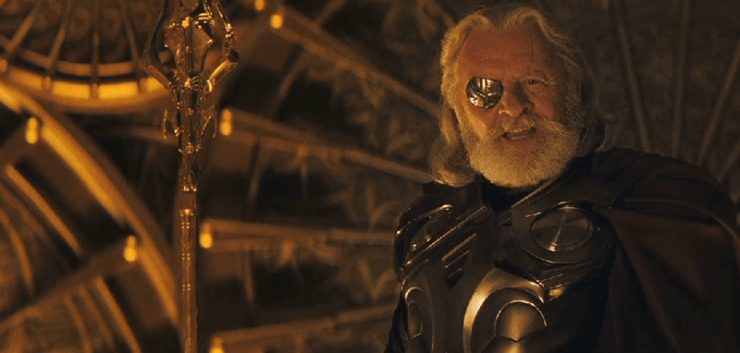
Sif, Heimdall, and Hogun take Fandral and Volstagg to the healer. Odin berates Thor, calling him impulsive and not fit to be king. For disobeying him, he is banished to Midgard, stripped of his power, his hammer Mjolnir also sent to Earth with an enchantment that whoever holds the hammer, if he be worthy, shall have the power of Thor.
Thor crashes to Earth, which brings us back to Foster’s RV, which hits Thor. He rants and raves, screaming to the sky about Odin and Heimdall, which makes perfect sense to the audience, less so to Foster, Selvig, and Darcy. Eventually, Darcy tazes him (“He was freakin’ me out!”), and they bring him to the hospital, where he’s sedated and restrained.
Foster and Selvig examine the data and are stunned to learn that Thor came through the phenomenon. It may be an Einstein-Rosen bridge—a wormhole that brought him from somewhere else in the cosmos. Realizing that they have a witness to this in Thor, they go to the hospital, but he has already broken out of his restraints and escaped. They find him when Foster accidentally runs him over again, and they bring him back to their lab, giving him fresh clothes (which belong to Foster’s ex, a doctor named Donald Blake). They take him to a local diner to feed him, and he expresses his delight for the coffee by smashing the coffee mug on the floor—Foster has to gently explain to him that that isn’t the custom there.
Thor’s hammer has landed in the middle of the desert, where a truck driver (who looks just like J. Michael Straczynski) tries and fails to pick it up. Soon he and his redneck buddies are all trying their hand at it while barbecuing hot dogs and drinking a lot of beer. (One of the rednecks looks just like Stan Lee.) Then Agent Phil Coulson shows up (a scene we already saw before after the credits in Iron Man 2) and brings a S.H.I.E.L.D. contingent to examine the hammer.
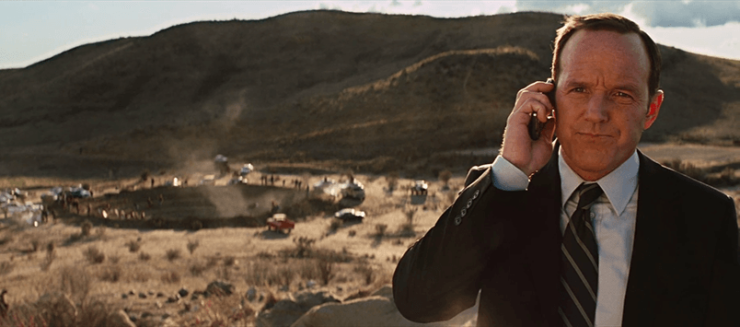
The rednecks wind up at the same diner as Thor and the others, and they tell of a “satellite” that fell to the Earth that no one can pick up about fifty miles west. Thor immediately gets up to head for it on foot. Foster wants to offer him a ride, but Selvig—who recognizes the references Thor makes in his crazy-seeming conversations from stories he heard in his childhood in Scandinavia—thinks he’s nuts and convinces Foster to let him go.
They return to the lab to find Coulson and assorted S.H.I.E.L.D. agents are confiscating all of Foster’s equipment and computers and backups. Selvig mentions a scientist he knew, an expert in gamma radiation, who got involved in something related to S.H.I.E.L.D. and was never heard from again. (This might be Dr. Bruce Banner.) He promises to e-mail a friend to find out more, but they have to use a computer at the local library, where Selvig finds a kids’ book on Norse myth.
Thor goes to a pet shop to buy a horse. As the store owner explains that he doesn’t have riding animals, Foster pulls up in her RV and offers him a lift, despite Selvig’s urging. Thor promises a full explanation of how he got to Earth after he retrieves Mjolnir. He’ll even retrieve what S.H.I.E.L.D. stole from her.
S.H.I.E.L.D. has set up an entire base around the hammer. No one can move it, and it’s giving off interference that’s messing with their tech something fierce. Thor fights his way through a bunch of really well-trained agents. Coulson sends Agent Clint Barton, a sharpshooter, to high ground, where he aims a bow and arrow at Thor. However, Coulson holds off on giving the kill order when he sees Thor approach the hammer.
Thor grips the haft, but cannot lift it. He is not worthy. Thor collapses and allows Coulson’s people to take him into custody.
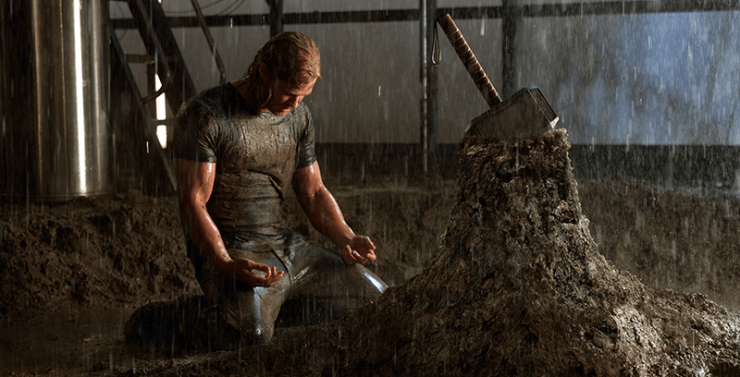
Meanwhile, in Asgard, Loki goes to the armory to clutch the Casket and it turns his skin blue but affects him in no other way. He confronts Odin, who admits that he didn’t just bring the Casket back to Asgard after defeating the frost giants, but also an infant who had been abandoned. He raised Loki as his own, hoping some day he might be the bridge to peace between Asgard and Jotunheim. Loki’s fury at the life-long lie—and the belief that he would never be made Odin’s heir, for who would want a frost giant on the throne?—devastates Odin, who collapses into the Odinsleep, a deep coma. With no indication of how long Odin will remain thus, Loki claims the throne. Sif and the Warriors Three petition Loki to let Thor come home, but Loki will not start his reign by reversing the last decision of his predecessor.
Loki then goes down to Midgard, disguising himself as a S.H.I.E.L.D. agent and telling Thor that Odin is dead, killed by the frost giants, that Frigga has insisted that Thor stay exiled. Loki says that he now rules and has brokered a tenuous peace with Jotunheim. Thor apologizes for what he has done to cause this. Loki also tries to lift the hammer, but he can’t either, to his annoyance.
He returns to Asgard, and then orders Heimdall to let him go to Jotunheim. Loki informs Laufey that he’s the one who let his agents into the armory during the ceremony, because he wanted to spoil Thor’s big day and let Odin see what a crummy king he’d make. Loki now offers to let Laufey’s forces invade Asgard and kill Odin. Laufey agrees.
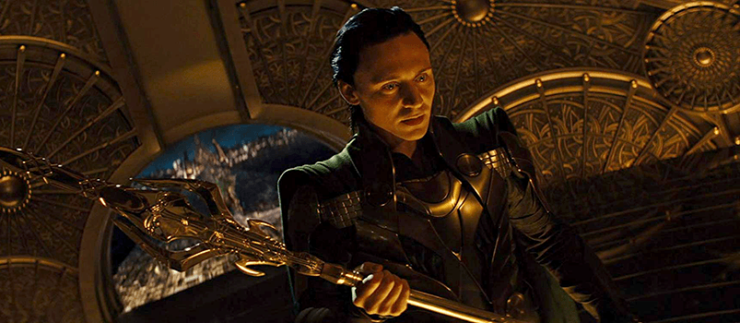
Sif and the Warriors Three decide to go to Midgard to bring Thor home. Heimdall hears this, of course, and summons them to the Bifrost. Heimdall accuses them of disobeying their king’s orders, and when they confirm it, he says, “Good,” and leaves the chamber, allowing the foursome to operate Bifrost themselves and go to Earth.
Selvig approaches the S.H.I.E.L.D. bunker, claiming that Thor is really Don Blake, a member of Foster’s team, and he got a little drunk and disorderly after S.H.I.E.L.D. took their stuff. Coulson knows he’s full of shit, but lets Selvig take him and has them followed. Selvig takes Thor to a bar where they drink, Selvig getting Thor to promise to leave town and leave Foster alone. His only concern is her well being.
They get really drunk, and Thor has to carry Selvig home. The next morning, Thor helps make breakfast—and then Sif, Fandral, Hogun, and Volstagg show up. They tell Thor the truth about what happened in Asgard, and Thor is pissed.
Loki, furious at Heimdall for letting Sif and the Warriors Three go, releases Heimdall from his post, and then freezes him with the Casket when he inevitably attacks Loki, since he’s no longer required to be loyal. Loki then frees the Destroyer and sends it to Earth to kill Thor and destroy everything.
The Destroyer arrives on Earth. Coulson and the gang confront it, wondering if it’s another one of Tony Stark’s suits of armor, and then it blows up several cars and stomps into town. Thor, Selvig, Darcy, and Foster try to get the populace to safety while Sif, Fandral, Hogun, and Volstagg try to keep it at bay.
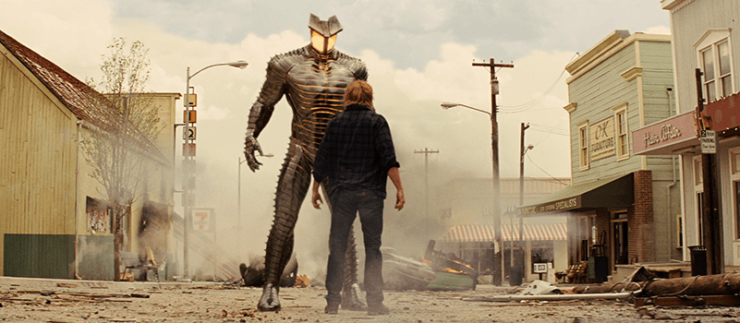
Finally, Thor tells the others to get back to Asgard. Thor confronts the Destroyer himself, even though he’s lost his power, and the Destroyer all but kills him, then walks away, its mission accomplished.
However, his self-sacrifice proves him worthy once again, and Mjolnir flies to his hand, his power restored. He makes short work of the Destroyer, then heads back to the Bifrost site to go home. Heimdall hears Thor’s call for help and manages to escape his icy prison, kill the frost giant guards Loki left on him, and bring them home. Before they go, Thor promises to return to Foster and they smooch. In addition, Coulson and Thor have a rapprochement, and Coulson promises to return the equipment they confiscated (Thor says “taken,” Foster says “stolen,” and Coulson says “borrowed”) and will allow Foster to continue her work.
They arrive in Asgard not long after Laufey begins his invasion. Heimdall and the Warriors Three are all injured, the former from Loki, the latter from the Destroyer, and Sif takes them to the healer while Thor confronts Loki.
For his part, Loki kills Laufey as he is about to kill Odin, making himself out to be Odin’s savior, and killing his biological father. Frigga learns the truth of what has happened from Thor. Loki returns to the Bifrost and opens it to Jotunheim, keeping it open long enough that its power will overwhelm the other realm and destroy it. Thor will not let him commit genocide—his time on Earth has changed him, as Odin had hoped—and he stops Loki by destroying the Bifrost with Mjolnir.
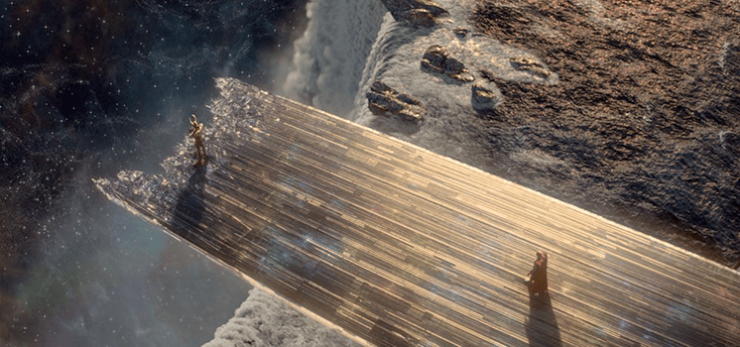
The explosion of Bifrost sends both Thor and Loki careening into the abyss. Thor catches Loki and Odin—having been awakened from the Odinsleep by his sons’ confrontation—catches Thor. Loki explains that he did it all for Odin, but Odin’s disappointed look cuts him to the quick and he deliberately lets go of Thor’s hand, falling into the abyss between realms.
A banquet is held in honor of Odin’s reawakening and Thor’s return. The Warriors Three and Sif sit at the main table along with another person (who looks just like Walt Simonson), telling stories of their exploits. Thor and Odin have a father-son bonding moment, and later Thor asks Heimdall if he can see Foster. He can, and she’s looking for him.
After the credits, we find that Selvig is now working for S.H.I.E.L.D., and is introduced to Nick Fury, who shows him the Tesseract, a source of great power. And then we discover that, somehow, Loki is controlling Selvig.
“Uh, base, we’ve got, uh, Xena, Jackie Chan, and Robin Hood”
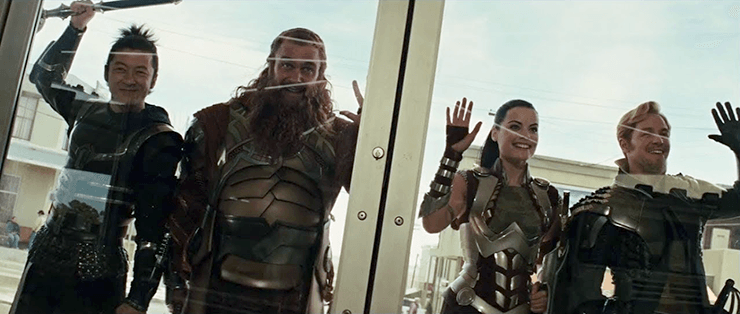
I truly regret that Jack Kirby didn’t live long enough to see this movie, because holy crap did Kenneth Branagh and his cinematographers and set designers do an amazing job of re-creating Kirby’s Asgard. I still remember sitting in the theatre in 2011 and gaping and bouncing in my seat and trying to not squee out loud, as the other theatre-goers would have frowned on that, when we got that opening shot of the realm eternal.
And then the Destroyer showed up and I wanted to squee again. The Destroyer first appeared in 1966 and it’s a classic Kirby creation, a huge metal machine crackling with energy. Few sights are as devastating as the Destroyer spitting fire from its faceplate, and Branagh stunningly re-creates that—with the added bonus of seeing the Destroyer flip itself around in order to repel Sif’s attack. Just brilliant.
Those are just two of many ways that Thor so perfectly nails the Marvel version of the Norse gods. Every single bit of casting is spot on. Jaimie Alexander is stupendous as Sif, perfectly embodying the character’s passion. (I actually watched Blindspot for Alexander, though I didn’t make it past the end of the first season, as it’s a spectacularly dumb show.) Ray Stevenson is a good Volstagg—not the perfect Volstagg, but Brian Blessed is really too old to play the role now—while both Tadanobu Asano’s intensity and Joshua Dallas’s dashing charisma are perfect for Hogun and Fandral. Rene Russo has nothing to do as Frigga, but she imbues the brief role with tremendous nobility, as does Sir Anthony Hopkins, who was pretty much born to play the Marvel version of Odin. Natalie Portman is quite delightful as a Jane Foster who is nothing like her comics counterpart, but her enthusiasm and science nerdery is actually kinda fun. Stellan Skarsgård always inhabits his roles perfectly, and he does so here with Selvig, modulating effortlessly from Foster’s wise mentor to Thor’s reluctant drinking buddy. Nobody ever went wrong casting Kat Dennings as a smartass. (I actually watched Two Broke Girls because Dennings is so awesome. Mind you, I didn’t make it past the middle of season two, because it’s even dumber than Blindspot.) And nobody ever went wrong casting Idris Elba in anything; his Heimdall is a rock, the one person you can count on to come through no matter what.
And then we have Chris Hemsworth and Tom Hiddleston who are beyond amazing. Hemsworth effortlessly blends Thor’s nobility, his arrogance, his charisma, and his lust for life. It’s a bravura performance, one that owes as much to Norse myth as it does Marvel Comics, but dammit, it works. Half the movie is carried entirely by his infectious grin. Hemsworth plays Thor as someone who is almost always having fun—but when he isn’t, those emotions are just as powerful, whether it’s sadness at Odin’s alleged death, anger at being forbidden from attacking Jotunheim, frustration at being trapped on Earth, or shut-down depression after failing to lift the hammer. It’s an emotionally complex performance far beyond what the character even needs to be effective, and Hemsworth deserves tremendous kudos for that.
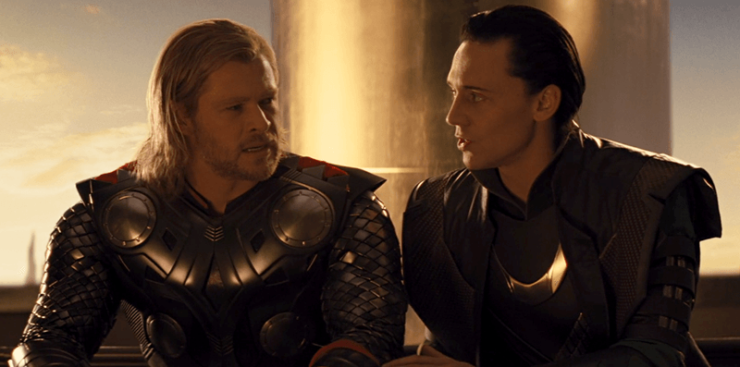
With all that, he’s almost completely blown away by the guy playing his brother, because holy shit is Hiddleston amazing. Loki is a self-centered figure of mischief, yes, one who prefers illusions and misdirection to the more direct battle that his brother and the other warriors go for, but he also simply wants to be a good son to his father. He envies Thor his place as their father’s favorite, and it leads him down the garden path to betrayal—but also to the throne. But Hiddleston beautifully plays the character’s tragedy, as even in the end, his only desire is to be accepted as an equal son by his father—and when the father won’t give it to him, he chooses oblivion. He’s still the best villain in the MCU pantheon, and will continue to be so through at least four more movies.
On top of that, we get our first really good look at S.H.I.E.L.D, as Coulson’s role is a bit bigger than his snarky government dude role in the two Iron Man films. We see Clark Gregg as the guy who’ll be leading the way in the Agents of S.H.I.E.L.D. TV show: effortlessly competent, able to roll with the punches, unflappable, but also willing to bend the rules as long as he can get a better result. He gives Thor the benefit of the doubt, not giving Barton the kill order and letting Selvig take him away to see what happens. (Thor calling him “Son of Coul” is also a classic line in a movie full of them.) Jeremy Renner also gives Hawkeye a nice debut, especially his line about starting to like the guy. We even finally see Jasper Sitwell, who has been the quintessential S.H.I.E.L.D. agent in the comics since around 1966.
The movie isn’t perfect. The script postulates Thor and Loki as kids in 956 AD, which is when the Scandinavian people worshipped the Asgardians as gods—yet how could those people have stories of Thor and Loki if they hadn’t actually grown up to have their adventures yet? In general, everything happens too fast. Odin’s shift from making Thor heir to banishing him is too much too quick, and Thor’s acquisition of humility also happens with absurd quickness, and while Thor and Foster’s meet-cute is indeed very cute, the depth of their passion makes no sense in so short a time.
Overall, however, this is a spectacular adventure, brilliantly acted, well written, and superlatively shot. This movie truly solidified the MCU as a thing—The Incredible Hulk hadn’t quite worked, but this, the first completely Tony Stark-free movie (save for a brief mention), proved that the wider universe was actually going to work.
Next week we go back to World War II and meet Captain America: The First Avenger.
Keith R.A. DeCandido has written the Marvel version of the Norse gods in the Marvel’s Tales of Asgard prose trilogy, which includes the novels Thor: Dueling with Giants, Sif: Even Dragons Have Their Endings, and Warriors Three: Godhood’s End. He’s also written the mythological version of several of the gods, including Odin, Tyr, Loki, Thor, Sigyn, and more in his cycle of urban fantasy short stories set in Key West, Florida starring Cassie Zukav, weirdness magnet. It includes a moment where a drunken Thor and an equally drunken Loki decide to drive to Hollywood and beat the crap out of Chris Hemsworth and Tom Hiddleston.










